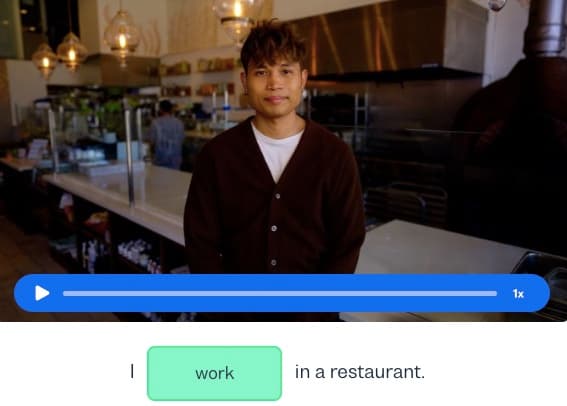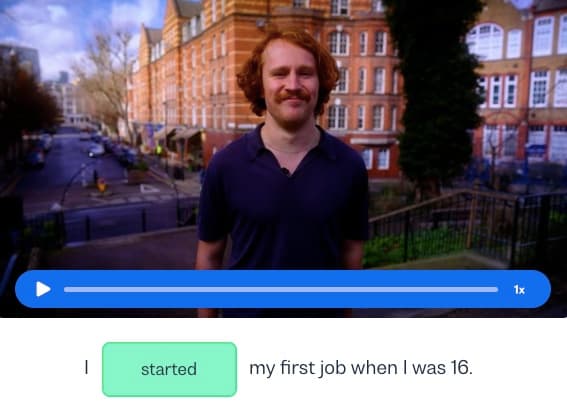I want to learn...
Author:

Grayson Steinberg
Whether you have a job interview tomorrow, you’re getting married next year or meeting a friend for coffee this afternoon, knowing when these things happen is critical. Without knowing the “when”, we’d never be able to clearly talk about when something important happened or make plans for the future!
Through verb conjugation, the English language expresses the“when” of an action or situation.
Read on to find out how we conjugate verbs in different forms of the past, present and future and resolve all your doubts about how to use different verb tenses.
Practice your English conjugation skills today!
You will learn that in the sentence "I work in a restaurant," the verb "work" is conjugated in the present tense, indicative mood, and first-person singular form. Try one of Busuu’s free online lessons and become an expert in conjugating verbs in English!
Verb tenses: The key to English conjugation
When we conjugate verbs (i.e. change their endings), it helps people to understand exactly when something happened or is going to happen.
Check out this English conjugation chart below to get a quick summary of English verb tenses and their corresponding verb conjugations (verb endings):
English verb conjugation chart
| Tense | Example | Verb conjugation |
|---|---|---|
| Present simple | I cook | main verb |
| Past simple | I cooked | main verb + (-ed ) (regular past participle) |
| Future simple | I (I’ll) will cook | will + main verb |
| Present continuous | I am (I’m) cooking | verb ‘to be’ + main verb + ‘-iing’ |
| Past continuous | I was cooking | was/were + main verb + ‘-ing’ |
| Future continuous | I will (I’ll) be cooking | will + be + main verb + ‘-ing’ |
| Present perfect | I have (I’ve) cooked | have + main verb + ‘-ed’ (regular past participle) |
| Past perfect | I had (I’d) cooked | had + main verb + ‘-ed’ (regular past participle) |
| Future perfect | I will (I’ll) have cooked | will + have + main verb + ‘-ed’ (regular past participle) |
| Present perfect continuous | I have (I’ve) been cooking | have + been + main verb + ‘ing’ |
| Past perfect continuous | I had (I’d) been cooking | had + been + main verb + ‘ing’ |
| Future perfect continuous | I will (I’ll) have been cooking | will + have + been + main verb + ‘ing’ |
Present tense conjugation
Present simple
We use the present simple to talk about something that happens all the time; in other words, a habit or a routine.
Conjugation: Conjugation: subject ("I", "you", "we") + main verb
Examples:
I drink 3 cups of coffee per day.
We use the Busuu app to study English.
When we use the third-person singular form of the present simple (i.e. the subject is he, she or it), the verb conjugation is slightly different:
Conjugation: subject ("he", "she", "it") + main verb + 's'
Examples:
He drinks 3 cups of coffee per day.
She studies English on the Busuu app every day.
When we want to use the negative form of the present simple, in other words, to talk about something that does not happen, we only need to add ‘don’t’ or ‘doesn’t’ to the base form of the main verb.
Base forms are verbs that have not been conjugated. You’ll find base verbs if you look them up in the dictionary: for example, play, do, dance, sing, talk, love, etc.
Examples:
I don’t drink coffee.
She doesn’t study English.
Present continuous
We use the present continuous to talk about something that is happening now or in the near future.
Conjugation: subject ("I", "you", "we") + am/are/is + base form of main verb + ‘ing’.
Examples:
She’s walking her dog around the neighborhood.
They’re looking for their missing cat.
The negative form of the present continuous works in a similar way. We only need to conjugate the verb ‘be’
Examples:
She isn’t walking her dog.
They aren’t looking for their missing cat.
Present perfect
We use the present perfect to describe completed actions in the past that still have an effect on the present. Basically, the present perfect tries to have it both ways by asking us to think about the past and present at the same time.
Conjugation (affirmative form): subject ("I", "you", "we") + have/has + past participle of the main verb.
Conjugation: (negative form): subject + haven't/hasn't + past participle of the main verb
There are both regular and irregular past participles: Think of regular verbs as the kids at school who always followed the rules and turned in their homework on time. Regular past participle verbs end in -ed:
Examples:
I have saved enough money for a plane ticket to Japan.
He has cooked a new dish for dinner.
They haven’t found a new apartment yet.
On the other hand, irregular verbs don’t exactly follow the rules. They have their own unique way of doing things, so they each have a different form.
Examples:
I’ve never eaten Spanish food before.
We’ve brought some sandwiches for the picnic.
Debbie hasn’t told me if she’s going to the party yet.
Present perfect continuous
We use the present perfect continuous to talk about actions and situations which began in the past and are still happening now.
Conjugation: subject ("I", "you", "we") + ‘have’ + been + base form of main verb + ‘ing’
Examples:
They’ve been dating for three months.
I’ve been traveling a lot for work recently.
Like its cousin the present continuous, verb conjugation is fairly simple. We only need to conjugate the verb ‘have’ and add the ‘-ing’ ending to the base form of the main verb.
Past tense conjugation
Past simple
We use the past simple to talk about completed actions in the past. It is often used to tell stories and describe past events.
Conjugation: subject ("I", "you", "we") + main verb + ‘ed’
Examples:
We danced all night long.
Robert celebrated his birthday with his friends and family.
Irregular verbs in the past simple are a whole world in themselves, since they don’t follow the same patterns as regular verbs.
Examples:
We sang three songs together at the karaoke bar.
Guillermo did a great job on his English exam.
I was cold because I forgot my jacket.
Pro Tip: While you might have been forced to memorize long lists of irregular verbs at school, it’s not exactly the most practical option (nor did it help you to learn them!) Instead, consider making your own flashcards of difficult irregular verbs or using Busuu’s Grammar Review now on web to guide you!
Past continuous
We can use the past continuous to talk about two different situations. In both cases, the verb conjugation is exactly the same:
(1) Talk about a longer action in the past that was interrupted by a shorter action.
(2) Describe an action in progress at a specific time in the past.
Conjugation: subject ("I", "you", "we") + ‘was/were’ + base form of main verb + ‘ing’
Examples:
(1) Susana and Matt were swimming when it started to rain.
(2) Last night, at around 6 p.m., we were cleaning the house.
Past perfect
We use the past perfect to talk about an action that happened before another action. In other words, we are already talking about the past, but then we grammatically “travel,” back in time to an “earlier,” past.
Conjugation: subject ("I", "you", "we") + ‘had/hadn’t’ + past participle of the main verb
Examples:
When I arrived at the office, the meeting had already started.
She slept until late because she had slept poorly the night before.
Past perfect continuous
The past perfect continuous is a hybrid of the past continuous and past perfect. It is used to talk about an action or situation that was happening before a particular moment in the past.
Conjugation: subject ("I", "you", "we")+ had + been + base form of main verb + ‘ing’
Examples:
When I met my partner, I had been living in New York for six months.
He’d been travelling through Europe when he got a call for the job interview.
Future tense conjugation
Future simple
We use the future simple to give information about the future or possible future events. The auxiliary verb ‘will’ is used with affirmative sentences and ‘won’t’ with negative ones.
Conjugation: subject ("I", "you", "we") + ‘will/won’t’ + base form of main verb
Examples:
I’ll probably take an Uber to the airport.
We won’t have time to visit the Empire State Building
Future continuous
The future continuous is used to refer to something that we know will happen at a particular moment in the future. We can also use it to talk about future events whose time/place have already been decided.
Conjugation: subject ("I", "you", "we") + ‘will/won’t’ + be + base form of main verb + ‘ing’
Examples:
The president will be giving a speech tomorrow evening at 8 pm.
Taylor Swift will be performing her new song at the awards ceremony.
Future perfect
We use the future perfect when we know or believe something will be finished by a certain time in the future.
Conjugation: subject ("I", "you", "we") + ‘will/won’t’ + have + past participle
Examples:
The kids will have gotten home from school by 4 pm.
By next week, they will have finished building the new classroom.
Future perfect continuous
We use the future perfect continuous to represent future actions or situations that we know we will be in progress at a particular moment.
Conjugation: subject ("I", "you", "we") + ‘will/won’t’ + have + been + base form of main verb + ‘ing’
Example:
By the time I’m 30, I’ll have been living in Spain for half my life.
English conjugation: Wrapping up
In this article, we’ve reviewed the basics of verb conjugation in English. Once you decide if you’re talking about the past, present or future, it’s a matter of putting the pieces together like a big puzzle.
With these rules in mind, carry on and practise, practise, practise. Before long, conjugating verbs in English will become a routine you do naturally and automatically, just brushing your teeth!
AUTHOR

Grayson Steinberg
Newlanguages


